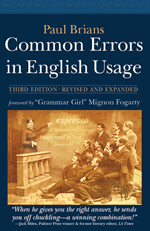This class is part of a sequence of courses in the humanities in Europe which are taught in the Department of English at Washington State University, Pullman, Washington. Humanities 101 covers the ancient world, 302 the Middle Ages and Renaissance, and this course the period from roughly 1750 to 1914. The period since 1914 is covered by the last course in the sequence, Humanities 304.
All are designed to be international and interdisciplinary, focusing on literary works outside of the Anglo-American tradition, on philosophy, and on art, architecture, music and–in the case of 304–film. While it helps to have some general historical knowledge of Europe before 1750, none of the other Humanities courses is a prerequisite for this one.
303 is the only one of these courses to have a descriptive subtitle that does more than indicate a period to be discussed. Obviously a course such as this cannot possibly “cover” such rich and varied material; and it has been designed to concentrate on certain crucial themes. What holds the course together is its focus on revolutionary movements and ideas which have had a lasting impact on western civilization and on the world at large. Much that we think of as “modern” began in the 18th and 19th centuries.
“Reason” refers to the French Enlightenment, that movement to use rationalism as a weapon against the forces of repression embodied in the monarchy and the church. Voltaire was the most popular if not the most influential of all the Enlightenment writers, and his Philosophical Dictionary contains lucid and entertaining presentations of all his major ideas. The rationalist tradition also influences later writers studied in this course, including especially Nietzsche and Marx. The rationalists are often associated with classical era music and neoclassical painting, which we will also explore.
“Romanticism” is the label for a literary-philosophical-artistic-musical-political movement which is often seen primarily as a rebellion against the stifling intellectualism and rigid logic of the Enlightenment, but it is much richer than that. It had a rich, multifaceted effect on Europe, more so than any movement since Christianity first swept over the area in the Middle Ages. Unlike the Enlightenment, which was at first confined principally to a few elites, it changed the way ordinary people viewed themselves, their relationships with each other, and their relationship to the natural world. It still largely shapes the way we think and feel today. It was not a simple revolt against reason in favor of emotion–though this stereotype has some truth in it–instead it was a major shift in values. No other movement in the last three centuries has affected so many different aspects of life, spread so widely, nor lasted so long.
Goethe’s Faust is the perfect work for illustrating the multifaceted, often self-contradictory nature of this movement. Reason and passion struggle together, tragedy blends into comedy, and the bounds of literature itself are stretched as a new form struggles to be born.
Much of the most popular music in the traditional concert repertory is still that which was first written in the romantic style. In some way or other, all succeeding styles either build on or react against romanticism. Neo-romanticism is a powerful force in contemporary music, in composers as different as Witold Lutoslawski and Alan Hovhaness. We also be looking at romantic painting.
Any of the works studied in this course could be described as “revolutionary,” but Zola’s Germinal and Marx’s Communist Manifesto are especially helpful in understanding the background to the great socialist revolutions which swept across much of the world in the first half of the 20th century. In contrast, Dostoyevsky’s Notes from Underground stands as a cry of anguish against socialism, against rationalism, against modernism generally. Dostoyevsky’s powerful case against the notions of progress and utopia still provides major weapons for conservatives and reactionaries today. Beethoven’s Ninth Symphony and Stravinsky’s Rite of Spring are examples of revolutionary music.
Nietzsche’s Thus Spoke Zarathustra in a sense sums up the entire course. Infused with both rationalism and romanticism, profoundly revolutionary and anti-political at the same time, leaving influences in philosophy, psychology, theater, fiction, art and music in a bewildering variety of directions, Nietzsche’s work continues to be a powerful influence on many thinkers today.
These are some of the movements and creative minds who have made the modern world what it is. They are not buried in history, but alive in the ways we think, feel, and perceive the world around us. By understanding them, we can better understand ourselves.
This is an upper-division class which requires advanced reading and writing skills. To judge whether you can handle the material, try using the online study guide to Voltaire’s Philosophical Dictionary while you read some of the assigned articles. You may need to reread carefully to extract the meaning from these articles. Students are not expected to be fluent in reading Voltaire at first, but you should be able to figure out his basic points and answer most of the study questions.
If you find the experience intimidating, please note that you are allowed to go back and revise any paper for this class and raise your grade; so even if you have trouble the first time around, you’ll have other chances. The online syllabus
